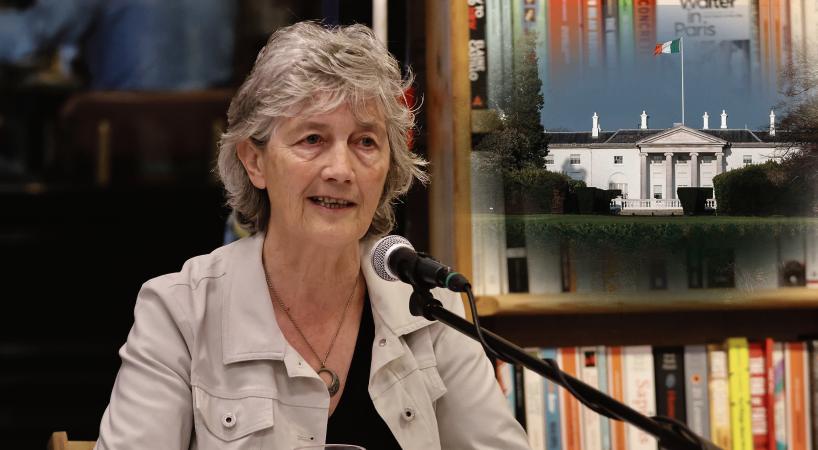Catherine Connolly’s landslide victory in Ireland’s presidential election marks one of the most transformative political moments in the country’s modern history. It is not merely a change in leadership but a reflection of a society yearning for moral clarity, compassion, and independence of thought in public life. Born in Galway in 1957, Connolly built her life and career on principles of fairness and service. Before entering politics, she worked as a clinical psychologist and barrister, combining intellectual rigor with a deep understanding of the human condition. Over the years, she emerged as a respected and fearless voice in Irish politics, known for her calm yet unwavering stance on social justice, Irish neutrality, and the defense of human rights.
As an independent Teachta Dála representing Galway West since 2016, Connolly often stood apart from party politics, refusing to compromise her principles for convenience. Her ability to question authority, challenge the establishment, and speak on behalf of the marginalized made her one of the most trusted political figures in Ireland. Her election as the tenth President of Ireland, succeeding Michael D. Higgins, was driven by a wave of public sentiment that valued authenticity over ambition and conscience over conformity. She won approximately 63 percent of first-preference votes, an overwhelming endorsement from the Irish people that cut across urban and rural divides, signaling a broad-based yearning for integrity in leadership.
Her campaign was rooted in humility and moral purpose. Connolly promised to restore faith in democratic institutions, bridge divisions within society, and strengthen Ireland’s tradition of neutrality and peace. She pledged to represent all people, regardless of class or creed, and to use the presidency as a platform for reflection, dialogue, and social inclusion. Her vision appealed deeply to young voters and working families who feel increasingly disconnected from the country’s political establishment. Her quiet determination and thoughtful manner contrasted sharply with the partisan tone that has characterized much of contemporary politics.
In her victory address, Connolly spoke of unity, justice, and human dignity. She acknowledged the challenges facing the nation such as housing inequality, economic insecurity, mental health crises, and environmental threats and emphasized that Ireland’s strength lies in empathy and community, not division. Her words reflected a profound understanding of leadership as service, not power. The Irish presidency, though largely ceremonial, carries immense symbolic influence. Connolly’s values-driven approach promises to redefine how that influence is exercised, turning moral conviction into a force for societal renewal.
Her views on international issues have already drawn attention far beyond Ireland. She has been an outspoken critic of militarism and foreign intervention, defending Ireland’s policy of neutrality as a moral compass in an increasingly polarized world. Her condemnation of the violence in Gaza, where she described Israel’s conduct as that of a “terrorist state,” and her call for accountability under international law, demonstrate her willingness to challenge global power structures. While some critics accuse her of being overly idealistic, many admire her courage to speak truth to power at a time when moral leadership is in short supply.
However, the road ahead is not without difficulties. The constitutional limits of the presidency mean that Connolly will have to balance her independent convictions with the impartial role expected of a head of state. Translating her social and ethical vision into practical influence will require diplomacy, restraint, and patience. Ireland’s political class will be watching closely to see how she navigates contentious issues such as Ireland’s position on European defense cooperation, the refugee crisis, and the economic pressures facing the country. Her ability to engage constructively while maintaining her independence will define her success as president.
For the international community, Connolly’s election is an inspiring example of how moral credibility can triumph over political machinery. Her rise illustrates the power of civic trust and ethical leadership in a world where politics often feels detached from humanity. It also reaffirms Ireland’s reputation as a nation guided by conscience rather than force—a small country with a large moral presence on the world stage. Her presidency may influence not only Irish identity but also global conversations about peace, justice, and human dignity.
Catherine Connolly’s ascent to the presidency is therefore more than a political victory; it is a reaffirmation of values that transcend party and power. It is about reimagining leadership as empathy in action and redefining patriotism as compassion for all. In her, Ireland has found a president who listens before she speaks, who questions without hostility, and who stands firm in her belief that politics can still be a vehicle for decency and truth. As she prepares to take office in November 2025, the Irish people look to her not merely as their head of state but as a moral compass for an era of uncertainty. Her presidency may well become a global symbol of how quiet conviction and moral courage can restore faith in democracy itself.

Leave a Reply